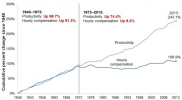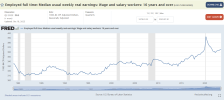The majority of companies I could work for want me to walk in with credentials proving I'll be competent and reliable. They then want me to be a cog in a well designed machine. They do NOT want me to be innovative, creative, overachieving, or really think for myself beyond filling the very limited role they have laid out. If you think I'm being overly dramatic here they pretty much said this outright in one of my Software Engineering courses in college. "We don't want heroes, we want people who can consistently generate code."
I could write a book on this, but I'll try to keep this reasonably brief. TLDR -
Quit whining, be patient, develop your skills and qualifications, get into the right company and department, and you'll probably have your chance.
This situtation isn't really much different now than it was 40 years ago, or 60 years ago. Large companies have regular product lines that will keep making them money regardless of innovation. Innovation still happens, but you need to understand that R&D is on the debit side of the ledger; it's not a profit center.
Are you familiar with TRL ("Technical Readiness Level")? I won't try to explain the levels here; google if you need explanation. The deepest, cutting edge stuff typically doesn't come from large corporations. TRL 1 is the domain of universities and gov't labs and there's very little ROI at that level. At my company, our R&D department was usually in the TRL 2-4 range and mostly funded with IRAD and a little CRAD; TRL 4 or 5 was in the "advanced programs" range, had more CRAD funding, and then technologies transitioned over to development contracts around TRL 5-7, which were customer funded and had a defined transition path to production, which is where the real money is made.
If you want real creative work, you need to understand the TRL mix of a company when you apply, and you need to target jobs that will get you into the lower TRL levels.
Now, having explained that aspect, let's consider the role of innovation a bit. At my division of Lockheed Martin, we had many new development activities and we needed and encouraged innovation and creativity. BUT IT HAS TO BE APPLIED TO THE CORRECT THINGS. I don't want someone bringing me new, innovative solutions to problems we solved 20 years ago; those existing solutions are adequate. I need creative people to be focused on
new problems, not yet solved, and really it's my goal to have as few of those things in a new product as possible. The more new inventions a product requires, the riskier its development.
Also, it's unreasonable to expect a new employee to be involved immediately in riskier, highly innovative work. First we need to assess his abilities on relevant tasks. Second the employee needs to learn our business and products. Third he needs to become familiar with company resources, methods, and processes.
Plus, a new grad or someone in a new industry needs time to develop a broader understanding. He needs to be aware of all the external aspects (operational environments, manufacturing processes, product support, customer preferences, etc., etc.) that determine the feasibility of his new creation.
This takes time.
Then you have to compete with large corporations who have entire teams of people to deal with each of those regulatory and liability headaches.... on top of having efficiency of scale making it hard for you to be competitive.
Small companies have the advantage of agility, and they have less overhead. This allows them to develop technologies in new, untapped small markets and grow the technical capability until it steals market from the big companies. Read Christensen's book
The Innovator's Dilemma.
Most of my friends in my age group are doing OK but I can't think of many I'd say are really thriving. Being a cog in the machine isn't a very fulfilling way to live.
It was no different when I was your age, and it's really no different for my current peer group.
That's life.







